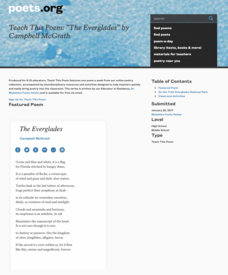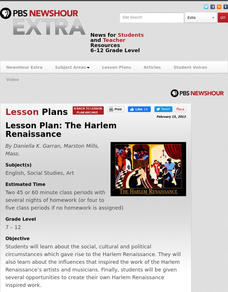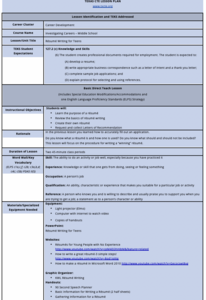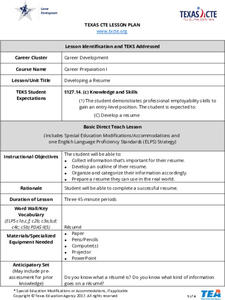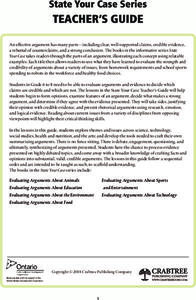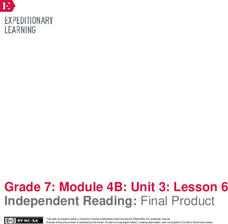Academy of American Poets
Teach This Poem: "Violin" by Nikki Wallschlaeger
Nikki Wallschlaeger's Violin is the featured poem in a lesson that uses music and multiple readings to delve deep into its analysis. After a writing warm-up, learners watch and listen to a video that showcases Regina Carter Quintet's...
Academy of American Poets
Teach This Poem: “The Everglades” by Campbell McGrath
Florida's Everglades come alive for young environmental scientists as they watch a video taken in the park and read a poem about the watery paradise. After a careful study of the two resources, class members consider the function of the...
Academy of American Poets
Teach This Poem: "Tuesday 9/11/01" by Lucille Clifton
A photograph and a poem remind young people of the events of November 11, 2001. After examining Andrea Booher's photograph taken on September 13, 2001, and reading Lucille Clifton's poem "Tuesday 9/11/01", scholars compare their...
Academy of American Poets
Teach This Poem: "Election Day, November, 1884" by Walt Whitman
To begin a study of Walt Whitman's poem, "Election Day, November 1884," learners first call out a word or two that describes their reaction to the recent presidential election. They then read an encyclopedia entry about the Presidential...
Academy of American Poets
Teaching the Vietnam War with Poetry and Archives
The language of and the perspective of photographs, poems, and official reports differ. After a close reading of two photographs, two poems, and a military report about the Vietnam War, individuals adopt someone's voice or something from...
PBS
The Harlem Renaissance
A reading of Walter Dean Myers' "Harlem" sets the stage for studying the literature, art, and music of the Harlem Renaissance. The lesson begins with a review of the social, political, and economic conditions of the 1920s and 1930s that...
Angel Island Immigration Station Foundation
Culminating Writing Project - Reporting on Angel Island
The unit study of Angel Island Immigration Station concludes with scholars using information from the previous lessons to craft a news story about the Angel Island program.
Angel Island Immigration Station Foundation
Making Your Mark: Free Verse Poetry
Using the insight they have gained into the experiences of detainees at the Angel Island Immigration Station, young poets create their own free verse poems that they feel captures what it may have felt like to be an immigrant interned on...
Humane Education Advocates Reaching Teachers
Justice for All - Educating Youth for Social Responsibility: Grades 6-8
Teach middle schoolers how to develop healthy relationships with activities and lessons designed to create a kind and inclusive
classroom. Pupils create guidelines to develop a safe and civil learning environment. They learn how to...
DocsTeach
Analyzing Jackie Robinson's White House Letter
Jackie Robinson: A hero on and off the field. An eye-opening activity focuses on Jackie Robinson's social activism during and after the civil rights movement. Academics read a letter addressed to President Nixon, answer questions, and...
Texas Education Agency (TEA)
The Job Interview
What makes for a successful job interview? Learners explore the topic by viewing a PowerPoint presentation, completing a KWL chart, and answering interview questions with a partner. Then, scholars participate in a mock job interview with...
ReadWriteThink
Captioning the Civil Rights Movement: Reading the Images, Writing the Words
Scholars boost their knowledge of the Civil Rights Movement with a lesson that challenges writers, readers, and historians to analyze primary sources and caption their observations. By way of reading, writing, discussion, independently,...
Texas Education Agency (TEA)
Résumé Writing for Teens
Writing a resume is as easy as 1-2-3. Teens learn the basics of resume writing by viewing a PowerPoint and completing a KWL chart. Next, they type and submit their resumes.
Texas Education Agency (TEA)
Developing a Résumé
Let's take a walk ... a gallery walk! Scholars view a PowerPoint and engage in discussion to learn about the importance of having a good resume. Next, they create their own resumes and present their work during a gallery walk.
Crabtree Publishing
State Your Case Series
Four lessons make up a unit focused on writing persuasive essays. Each unit builds on the last, ultimately taking pupils through the writing process. Scholars make a claim, create an argument, debate both sides, then state their opinion....
Teaching Tolerance
In Our Own Words: A Story Book with a Purpose
Academics turn into storytellers in an engaging activity on activism. The activity focuses on promoting social change in local communities with stories. Young historians plan a storybook to target a specific audience and social issue and...
Teaching Tolerance
Social Media for Social Action
Engage in activism, not slacktivism! Scholars discuss social media and the Internet as tools for social change. Next, they engage in a close reading strategy called Thinking Notes as they read an article about social media activism.
Teaching Tolerance
Advertising on the Internet
Believe it or not, everyone plays a role in Internet advertising. Scholars explore the topic with a podcast about Internet advertising and personal identity. Next, partners plan and produce their own public service announcements to...
Benjamin Franklin Tercentenary
Let’s Throw an Electric Science Party!
Are you looking for a shockingly good lesson plan? Check out one that has middle schoolers recreate four of Benjamin Franklin's experiments. Groups investigate, observe, and draw conclusions about static electricity and electrical...
EngageNY
End of Unit Assessment, Part 1: Revising Claims and Evidence based on Feedback
What to do with all that feedback? Scholars use colored writing instruments to circle any feedback that relates to the first two rows of the grading rubric. After working on revisions for their papers, learners view the performance task...
EngageNY
Final Performance Task: Sharing Visual Representations of Position Papers
Let's take a stroll! Scholars go on a gallery walk to view the visual representations for the performance task created by the class. They then view a variety of books about environment and sustainability and conduct book talks on the...
EngageNY
Finishing the End of Unit 3 Assessment: Final Draft of Position Paper and Reflection on the Writing Process
Scholars work on the end of the unit assessment by reflecting on their writing. They answer questions about the process they used to complete their position paper essays. After completing the end of unit assessment, they add images to...
EngageNY
End of Unit Assessment, Part 1, Continued: Revising Vocabulary and Conventions based on Feedback
Howdy, partner! Scholars partner up to look at the last two rows in the writing rubric. After discussing the details in the rubric about organization and conventions, learners use colored writing tools to circle feedback in their...
EngageNY
Independent Reading: Final Product
Cheater, cheater. Learners create cheat sheets about their independent reading books to help others determine if the text interests them. After creating drafts of their sheets, scholars pair up for a peer review and then complete a final...



